Key takeaways:
- Nightclub music venues serve as transformative spaces where artists and audiences connect through live music and emotion.
- Original tracks are vital for establishing an artist’s identity and fostering a deeper connection with the audience.
- Creating unique sounds involves experimentation, embracing imperfections, and valuing feedback from others.
- Networking in the nightclub scene is essential for building genuine relationships, leading to collaboration and opportunities for artists.
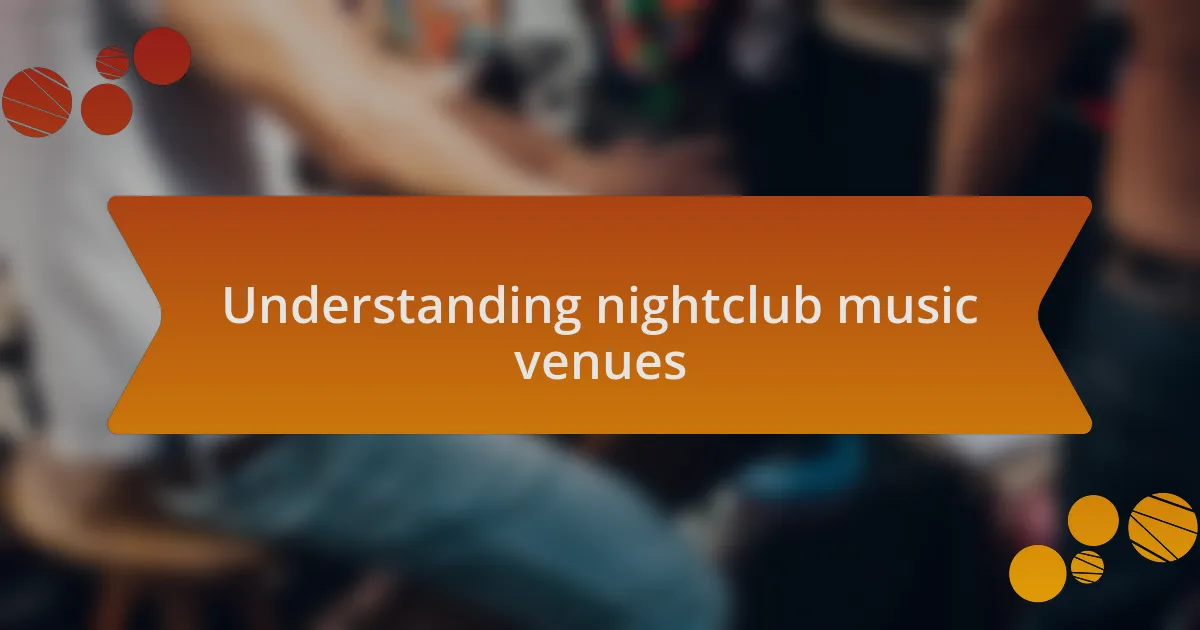
Understanding nightclub music venues
Nightclub music venues are unique spaces that blend various elements to create unforgettable experiences. From the pulsating beat of the bass to the flickering lights that wash over the crowd, these venues become living entities where music and emotion collide. Have you ever felt that rush when your favorite track drops? It’s in those moments of connection that you truly appreciate the artistry behind the music.
I remember the first time I stepped into a vibrant nightclub. The air was thick with excitement, and the energy was almost palpable. Each DJ spun their stories through sound, making the crowd sway as one cohesive unit. It struck me then that these venues are not just places to dance; they are stages for creativity and expression, where artists can share a piece of themselves with the world.
Understanding nightclub music venues means recognizing their role in the music scene. They are sanctuaries for both emerging talents and established stars, offering a platform for diverse genres. Have you ever thought about how a venue’s atmosphere influences the music experience? The right lighting, layout, and acoustics can elevate a simple night out into a transformative journey, showcasing the real power of music.
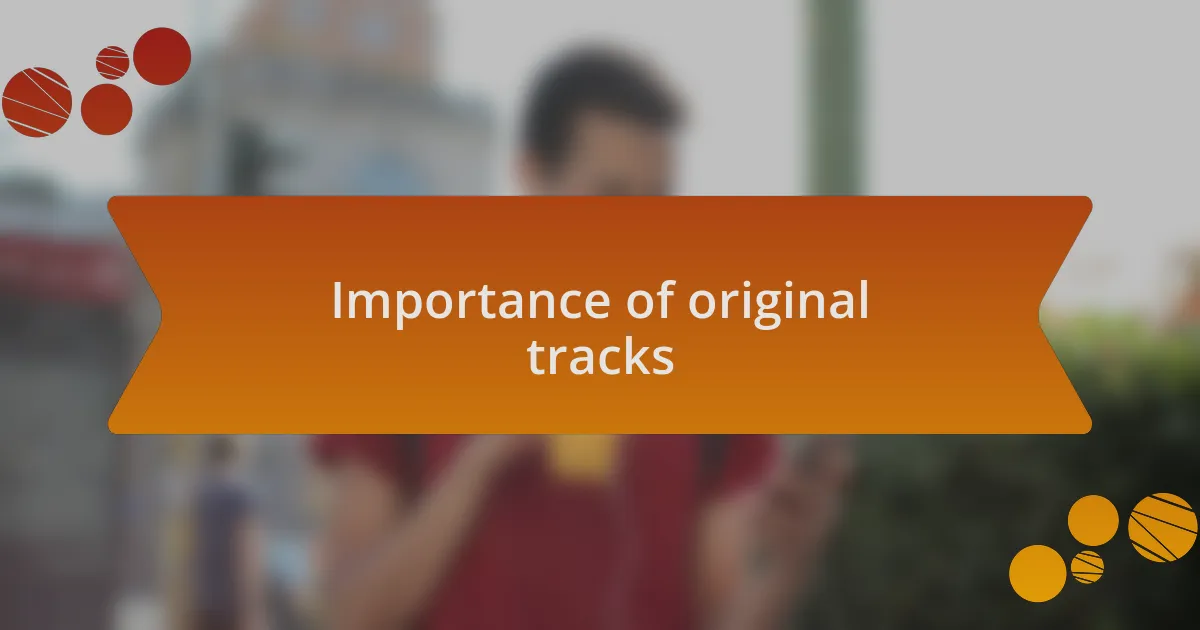
Importance of original tracks
Original tracks play a crucial role in defining the identity of a nightclub. When I hear a fresh, unique beat, it sparks an undeniable thrill that can’t be replicated by familiar hits. Isn’t it fascinating how original tracks can transport you to another realm, creating a vibe that feels uniquely tied to that venue?
From my experience, original music ignites a deeper connection between the artist and the audience. I recall a night when a local DJ unveiled an original track, and the entire crowd erupted. That moment wasn’t just about the music; it was about sharing something new that resonated with everyone present. The energy in that room was electric, proving that original tracks can forge unforgettable memories.
Furthermore, original tracks help musicians establish their brand and presence in the competitive nightclub scene. Each distinct sound encapsulates an artist’s vision, making it essential for them to develop their catalog of original material. Have you ever noticed how certain nights feel extra special because of a standout original track? It’s these moments that emphasize the importance of creativity in shaping the nightlife experience.
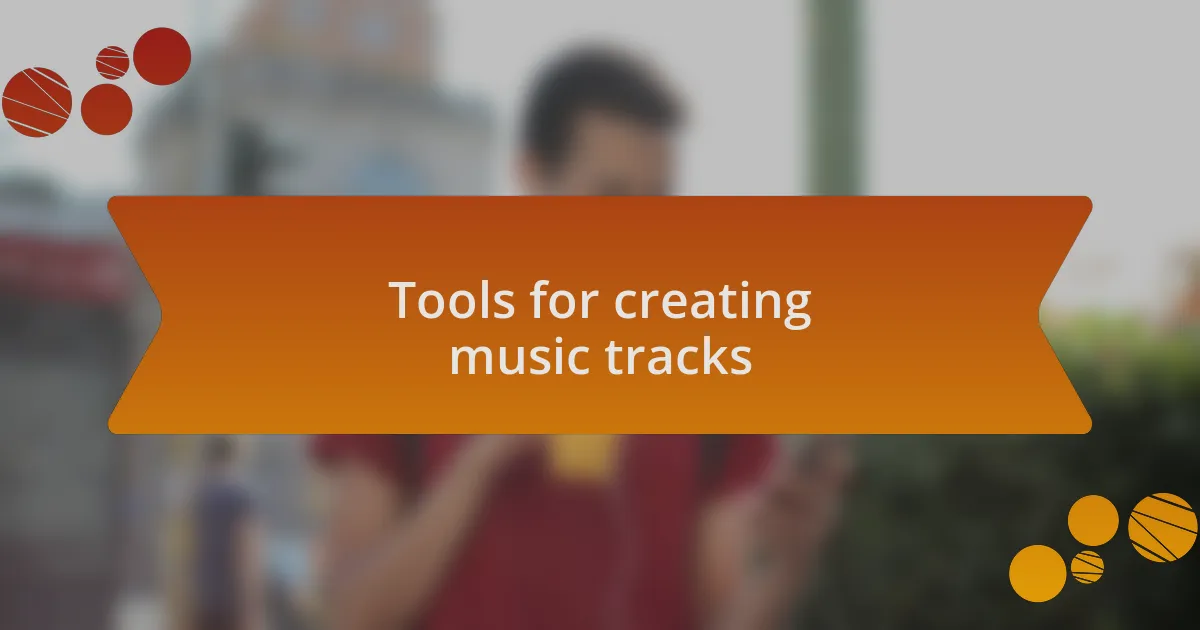
Tools for creating music tracks
When I dive into creating original tracks, the right tools make all the difference. Software like Ableton Live and Logic Pro X have been game changers for me, offering endless possibilities for sound manipulation. I remember the first time I mixed my own beats—those platforms felt like a playground where creativity had no limits.
Samples are another key component in track creation. I often explore libraries like Splice and Loopmasters, where I can find unique sounds that set my music apart. One evening, I stumbled upon a quirky drum loop that inspired an entire track. It’s amazing how a single sample can spark an idea and lead to something completely original.
Let’s not forget about hardware. Having a good MIDI controller can elevate your production process significantly. I experienced this firsthand when I purchased my first MIDI keyboard—it made playing melodies so much more intuitive. Have you ever felt an emotional connection to your instruments? That feeling can truly enhance the creative process and encourage experimentation.
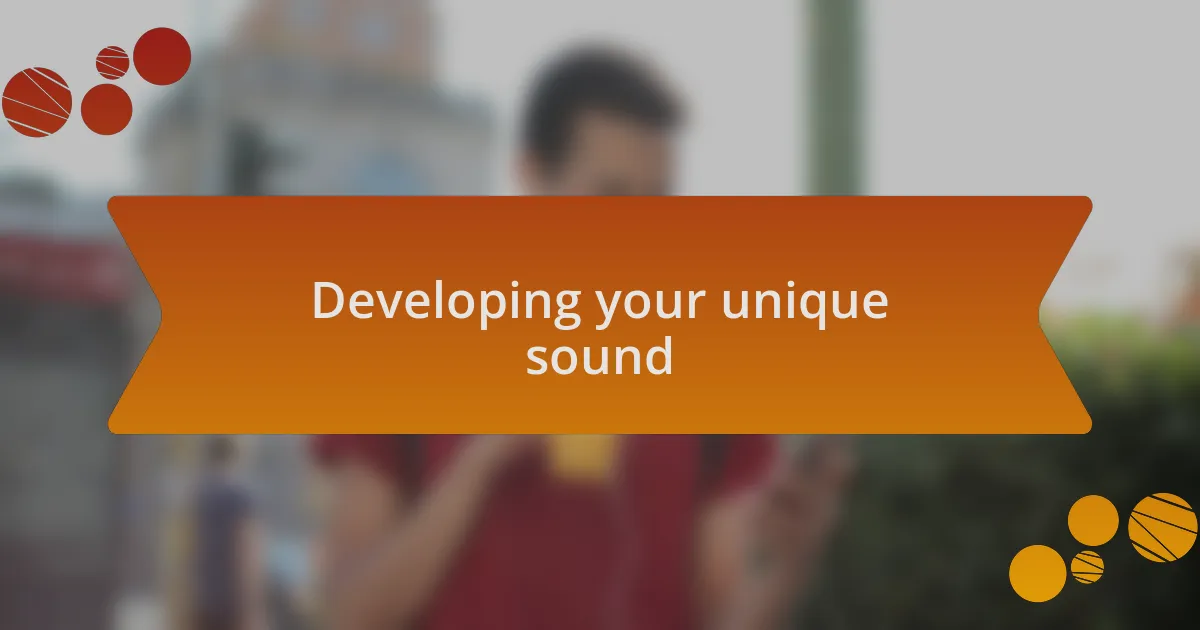
Developing your unique sound
When developing your unique sound, I believe it’s essential to draw inspiration from various genres while still staying true to your personal style. I often find myself listening to a mix of electronic, jazz, and even classical music. One time, while experimenting with a jazz chord progression, I stumbled upon a beat that brought a fresh light to my sound. It hit me—blending different influences can lead to something uniquely captivating.
It’s also about embracing imperfections and unexpected sounds. In one of my tracks, I accidentally recorded a sound from my kettle boiling. The result was surprisingly intriguing, adding a layer of warmth that I wouldn’t have achieved otherwise. Have you ever considered how a small mistake could turn into a defining feature of your music? I encourage you to embrace those moments; they can lead to discoveries that shapes your style.
Moreover, feedback from others is invaluable in this journey. I remember sharing a rough demo with a fellow artist, and their enthusiasm for a particular synth line inspired me to explore that direction further. It’s fascinating how an outside perspective can shed light on elements of your music that you might overlook. Engaging with a community, whether online or at a nightclub, can accelerate your growth and help refine your unique sound.
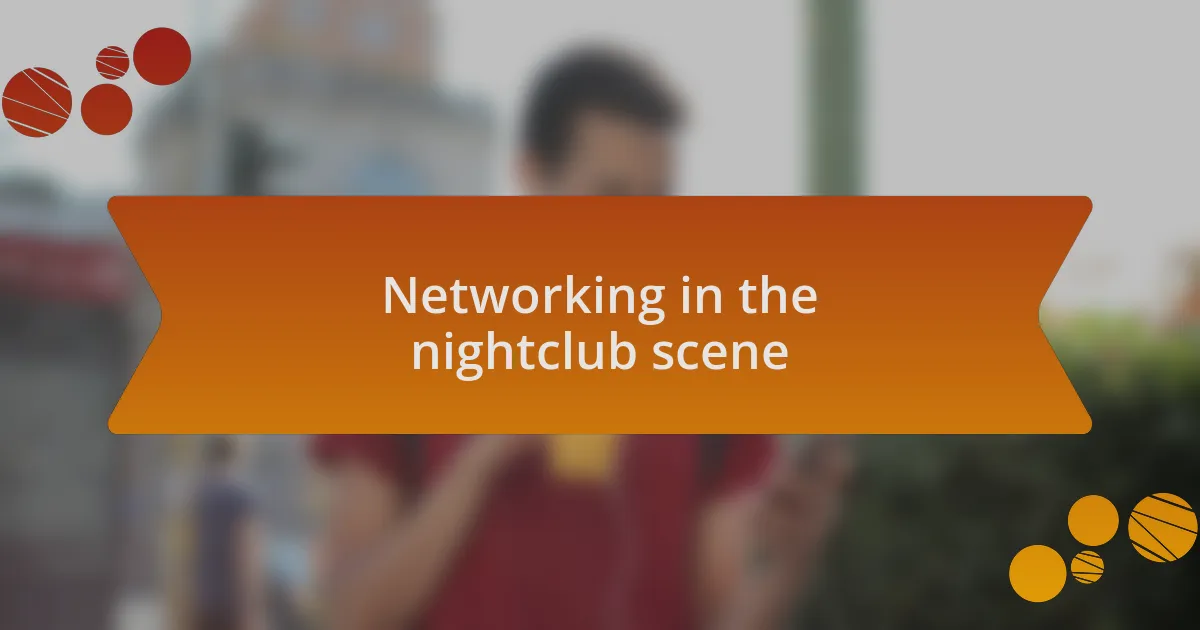
Networking in the nightclub scene
Building connections in the nightclub scene can be a game changer for aspiring artists. I remember my first night out at a local venue, feeling the vibrant energy buzzing around me. I struck up a conversation with a DJ after his set, and that simple exchange led to an invitation to collaborate on a track. It was a reminder that sometimes, the most unexpected interactions can open doors that lead to exciting opportunities.
Attending events and networking is not just about handshakes; it’s about forming genuine relationships. One time, I met a promoter who later featured my music in a showcase. That performance wasn’t just a chance to play; it became a catalyst for meeting fellow musicians and fans who resonated with my work. Have you considered how these connections could evolve into long-term partnerships? Engaging fully in these spaces can inspire you and push your creative boundaries.
It’s crucial to be authentic in your networking efforts. When I approached others with a true interest in their music and experiences, it fostered a welcoming atmosphere. Asking about their journey often sparked immersive conversations, creating a sense of camaraderie. How can we uplift each other in this scene? By sharing stories and insights, we not only network but also cultivate a community that thrives on collaboration and support, journeying together toward our musical aspirations.
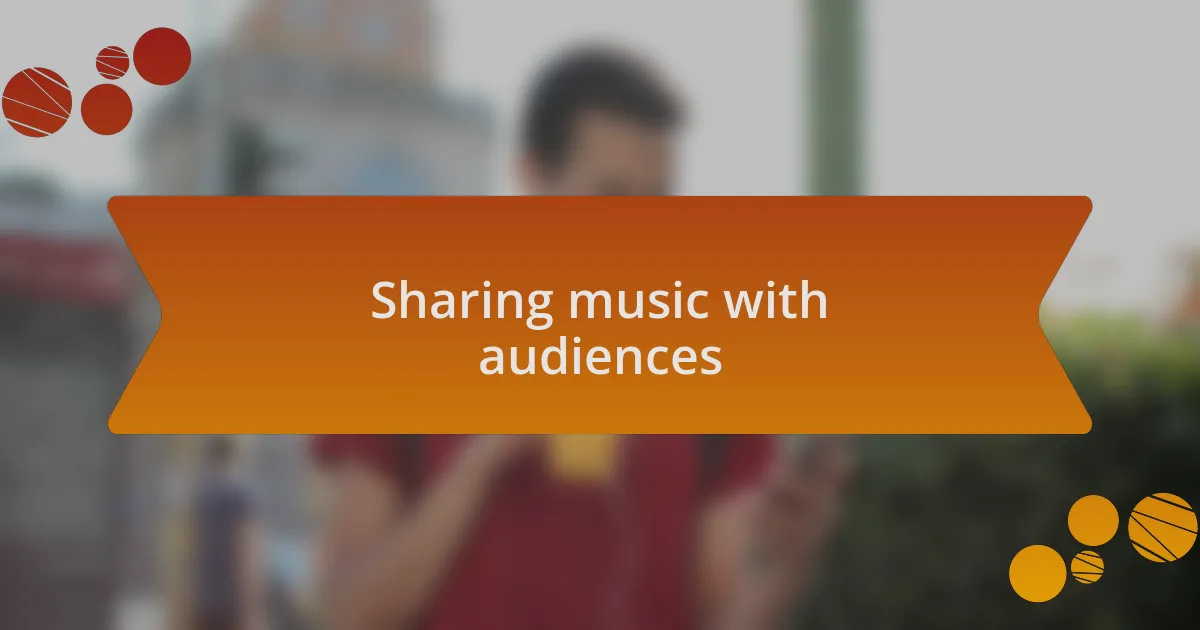
Sharing music with audiences
Sharing music with audiences is one of the most thrilling experiences an artist can have. I vividly recall my first live performance at a bustling nightclub; as I watched the crowd respond to my original tracks, it felt like every note I created was echoing back to me in their cheers and applause. That connection is electrifying, and it reminds me of why I create music in the first place. How often do we get to see our art transform a space, making it come alive with energy and emotion?
I’ve learned that sharing music goes beyond just playing tracks; it’s about creating an atmosphere where everyone feels included. During one of my shows, I encouraged the audience to sing along during a chorus, and the collective sound was nothing short of euphoric. It was a moment of unity, where my music became a shared experience rather than just a performance. This makes me wonder, how can every artist tap into that sense of togetherness, ensuring their audience feels not just spectators, but participants?
Engaging with the crowd further enhances the experience. I like to observe how people react; their smiles, their movements, even their stillness tells a story. At a recent gig, I noticed someone in the front row who was completely absorbed in the music, and his energy fueled my performance. Seeing reactions like that can be incredibly inspiring. Can we harness these moments to deepen our connection with audiences? In my journey, I’ve realized that by sharing not just my music but also my stories, I can create a bridge that draws listeners in and invites them to be a part of my musical journey.